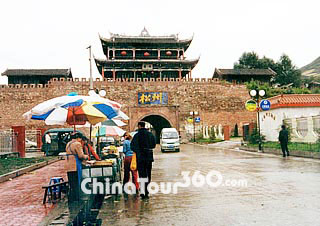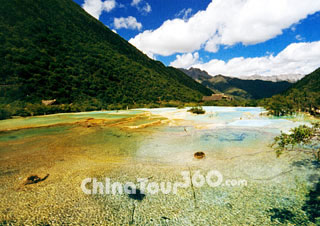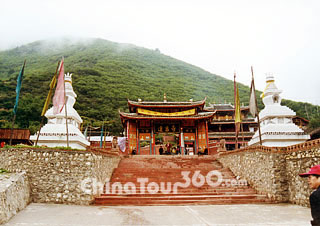 Songpan Ancient County
Songpan Ancient County Huanglong Scenic Area
Huanglong Scenic Area Daji Temple
Daji Temple
The Ngawa (Aba) Tibetan and Qiang Autonomous Prefecture is located in the northwest area of Sichuan Province, adjoining the capital city of Chengdu in the east. It lies in the southeast corner of the Qinghai-Tibet Plateau, and in the conjunction zone of the northern Hengduan Mountains and the northwestern high mountains and gorges. The physiognomy shows off plateaus, high mountains and gorges, dropping from the southeastern region to the northwestern region. The area is traversed by the main branches of the upstream Yangtze River - the Min and Dadu rivers. It is also the only region in Sichuan that Yellow River passes by, thus functioning as the main waterhead for the upper reaches. Ngawa is best known for the pristine natural scenery, ecological environment, and folk cultures.
The peculiar geographic environment produces spectacular landscapes and valuable natural resources within the area. Ngawa boasts three of the five world natural heritages of China - Jiuzhaigou, Huanglong and the Giant Panda Habitats: Wolong, Mt. Siguniang and Jiajin Mountain. What's more, Ruoergai Grassland, Dagu Glacier and Miyaluo are also among the most attractive scenery of the area.
Ngawa is also a picturesque 'folk passage' with deep cultures. It has a population of 858,000, including Tibetan (54.6%), Qiang (18.6%), Hui, Han, Xianbei and other nationalities. This prefecture is the second largest Tibetan area in Sichuan and the main concentration of Qiang people in China. Since time immemorial, many nationalities have created brilliant and distinctive cultures here. Tibetan culture, Qiang culture and the culture of Tibetan Buddhism are the most impressive here. The local houses, Tibetan Operas, Gorchon Dance, various Tibetan Buddhist relics and festivals, and Qiang flute performances, are among the highlights that are worth seeing.
Ngawa boasts a long history. It had been inhabited by our ancestors for 5,000 years, dating back to the great Yingpanshan Culture. And it had been an administrative region in 316 BC. In the 1930s, during the heroic 'Long March', the CCP experienced the most difficult and dangerous stage of the journey here. The area is known as the snow mountain and grassland' of the march, where the army had struggled for over a year. Now there are 9 counties and 114 villages and towns within the area are named as 'old revolutionary bases'. Ngawa was liberated and built as a Tibetan autonomous region in year 1952, and was finally renamed as Ngawa Tibetan and Qiang Autonomous Prefecture in 1987.
![]() Recommended Ngawa Tour Itinerary:
Recommended Ngawa Tour Itinerary:
China Memorable Tour with Huanglong: 14 Days of Beijing - Chengdu - Jiuzhaigou - Huanglong - Chengdu - Leshan - Mt. Emei - Chengdu - Chongqing - Yangtze River Cruise - Yichang - Guangzhou
![]() Ngawa (Aba) Attractions:
Ngawa (Aba) Attractions:
Jiuzhaigou Scenic Area, Huanglong Scenic Area, Wolong Nature Reserve, Dagu Glacier, Mount Siguniang, Ruoergai Grassland, Miyaluo, Jiajin Mountain, Langyi Monastery, Gerdeng Temple, Gemo Temple, Songpan Ancient County
![]() Dining
Dining
There are Sichuan dishes, Muslim dishes, Tibetan dishes and Qiang dishes in Ngawa. With the majority of Tibetans and Qiang ethnicities, the dining of Ngawa has distinctive flavors, characteristic of those two nationalities. The daily food of Tibetans includes yak butter tea, Tsamba (parched barley flour), beef, mutton, chang (brewed barley wine), barley noodles, buns and fried cakes, pickled cabbages and milk products. While in Wenchuan, Li, Songpan and other concentrated counties of Qiang, the food is mainly pickled cabbages, 'mian zheng zheng' (steamed buns made of corn or wheat flour), 'jin guo yin' (steamed corn flour with rice), 'yin guo jin' (steamed rice with corn flour), parched barley or wheat flours, bacon pork, sausage and brewed barley wine.
![]() Lodging
Lodging
As a most well-known tourist destination, lodging in Ngawa is really no problem. There are over 500 hotels distributed around the scenic spots, ranging from small guest houses to five-stars. All hotels can offer safe, healthy and considerate service.
![]() Shopping
Shopping
The local products that can be purchased as souvenirs include various Chinese medicines, such as cordyceps, caladium, gastrodia tuber, ginseng and musk; fruits like apples, walnuts and sweet cherries; wild fungi; Tibetan and Qiang arts and crafts, such as costumes, Tibetan knives, lighteners, musical instruments and Thangkas.
![]() Transportation
Transportation
At present, there are only flights to Chengdu and buses to Chengdu, Dujiangyan, and other places of Sichuan in Ngawa. As Ngawa is more than 100 kilometers (62 miles) away from Chengdu, the best way to get there is transferring in Chengdu. Jiuzhai Huanglong Airport, located in Songpan County of Ngawa, has several flights between Chengdu and Jiuzhaigou daily, but fewer during the winter. It is the most convenient way to get to Jiuzhaigou, Huanglong and other surrounding locales. In Chengdu, there are two passenger stations which operate buses to every county of Ngawa.
|
Festivals
|
Time
|
Notes
|
|
Lunar Jan. 1st
(lasting just over half a month at the most) |
Celebrated grandly by all nationalities
|
|
|
Tibetan New Year
|
Jan. 1st on Tibetan Calendar
(lasting half an month) |
Traditional Tibetan festival; grand Gorchom Dance celebration in Maerkang County, capital of Aba
|
|
Qiang New Year
|
Lunar Oct. 1st
(lasting 3 - 5 or 10 days) |
Traditional Qiang festival
|
|
Ice-waterfall Tourism Festival of Large Jiuzhai
|
January
|
Ice and snow related activities; Jiuzhaigou - the main celebrated stage
|
|
International Panda Festival
|
September
|
Jiuzhaigou - sightseeing, business, lecture and art exhibition
|
|
Monlam Festival
(Great Prayer Festival) |
Lunar Jan. 3rd - 17th
|
Tibetan religious festival
Highlights: sermons, praying, Buddha unfolding, Changmo Dance, Buddha parading, butter sculptures show; Hotspot - Gerdeng Temple, Gemo Temple, Langyi Monastery |
|
Huanglong Temple Fair
|
Lunar Jun. 15th - 17th
|
Huanglong Temple - prayer ceremonies of all nationalities; dragon dance, lion dance, Gorchom Dance, love songs; tasting local food; purchasing local products
|
|
Zhachong Festival
|
Jun. 15th - 17th
|
Traditional Tibetan festival in Ngawa County;
Activities: pottery trade, horse racing, wrestling, Gorchon Dance
|
|
Viewing Flower Festival
|
Lunar Jun. 18th
(lasting 3 or 4 days or over 10) |
Tibetan festival; playing in the tents; bonfire parties
|







